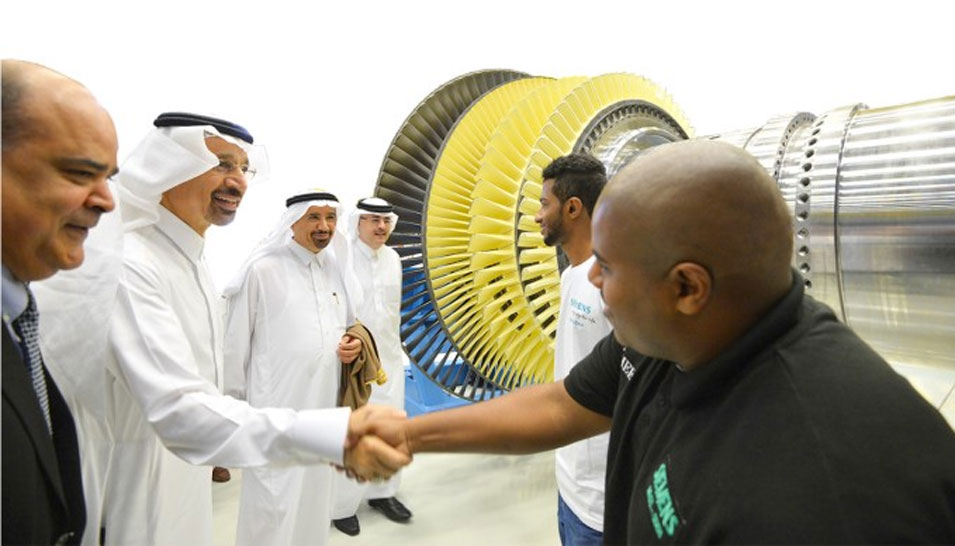
HE Khalid A. Al-Falih, Minister of Energy, Industry and Mineral Resources, greets two young Saudis who worked on the first gas turbine ever assembled in Kingdom.
A hulking gas turbine - an example of high precision engineering - stands at Siemen’s Dammam Energy Hub complete and ready for delivery to Saudi Aramco’s vast economic city mega-project in Jazan.
This turbine represents much more than just another piece of Saudi Aramco’s power generation apparatus. It is the first such turbine assembled in Saudi Arabia with young Saudi talent playing a substantial role — an achievement that has been lauded by both the government and Saudi Aramco as being in alignment with the aspirations of the Kingdom’s bold economic vision for 2030 and a vivid illustration of how Saudi Aramco’s In-Kingdom Total Value Add (IKTVA) program is delivering results.
Five more gas turbines will be assembled in Dammam for the Jazan project, a prospect praised by Minister of Energy, Industry and Mineral Resources HE Khalid A. Al-Falih as an example of “leadership” at an unveiling ceremony this week.
Domestic Value Creation
Through the IKTVA program, Saudi Aramco is taking action to drive additional domestic value creation in support of a rapidly changing Kingdom and foster future prosperity. Its goal is to provide jobs for the growing Saudi population and stimulate the diversification of the economy.
It was in 2011 that Saudi Aramco, together with Siemens and the Saudi Electricity Company, jointly committed to build the Siemens Dammam Energy Hub. It would be based in Dammam 2nd Industrial City, an industrial cluster operated by the Saudi Industrial Property Authority (MODON).
The symbolic gravity of the recent unveiling of Saudi’s first locally assembled gas turbine was underlined by the patronage of Al-Falih.
Also in attendance were Saudi Aramco president and CEO Amin Nasser; Joe Kaeser, president and CEO of Siemens AG; HE Boris Ruge, ambassador of the Federal Republic of Germany to Saudi Arabia; and other dignitaries from the government and both companies.
Transformation
Coming just a month after the Custodian of the Two Holy Mosques, King Salman ibn ‘Abd Al-’Aziz Al-Sa’ud, made a declaration of the Kingdom of Saudi Arabia’s Vision 2030, Al-Falih said the Siemens achievement offered proof that all of the enabling elements to make that vision a reality are available to the Kingdom. The National Transformation Program, due for release soon, would further articulate the detail of the vision.
“The first and most important element is human resources, which is being nurtured by a successful cluster of ongoing partnerships whose goal is to develop and devise new and innovative ways to train young Saudis,” Al-Falih said.
“The second element is infrastructure, an excellent example of which can be witnessed in the MODON. Being here in one of its cities today, we can see the fully integrated infrastructures that enable prosperous industries.
“The third element of the Vision’s success is integration, where different sectors of economic activity are interconnected to complement each other. The Kingdom has linked today, and for the first time, its mining, manufacturing, and energy sectors, and the demand for its products.”
Al-Falih used his address to the event to congratulate Siemens and to outline how the construction of the first gas turbine in Saudi Arabia resonates with the Kingdom’s ambitions to transform its economic landscape and provide opportunities for its youthful population.
Dramatic Development
Al-Falih promised that Saudi Arabia will undergo “dramatic” industrial development over the next 15 years.
“Not only in the industrial sector, not only in the sector of energy broadly — from oil and gas, to conventional power, to unconventional power — but also in new fields that will rely on the ingenuity of the Saudi people, academic and research institutions that will bring competitive forces to the Kingdom with those foreign partners to create a more diverse and vibrant, more competitive, and more rewarding economic landscape here in Saudi Arabia for everybody.
“All of the stakeholders will benefit, first and foremost the young people of the Kingdom who deserve the best opportunities, but also importantly and equally for the investors who make the right choice, who are banking on the Kingdom to provide the conditions to prosper and invest and grow and who will be rewarded.”
The Minister said Saudi Arabia was ready to prove itself and embark on a great economic transformation.
“In Saudi Arabia, we will prove every word we have said, and once again I will say that our Vision 2030 is only the beginning of this great transformation that will take place in the next 15 years.”
IKTVA Boost
Nasser explained the important goals for Saudi Aramco’s IKTVA program.
“The IKTVA program is designed to double the percentage of locally produced energy-related goods and services, and to create quality employment opportunities for Saudis. These challenging objectives can be achieved only if we join hands and work together. With its Energy Hub in Dammam, we see a flourishing partnership with Siemens, of which we have today reaped the first fruits together,” Nasser said.
Siemens embarked on a massive program to train young Saudi talent in turbine technologies, both locally and abroad. The graduates from the program are employed at the Dammam Energy Hub and represent, in part, the next generation of experts who will shape the future of the energy industry in the Kingdom.
Al-Falih and the other dignitaries toured the Siemens facility and met with young Saudis who helped assemble the first gas turbine ever made in the Kingdom.